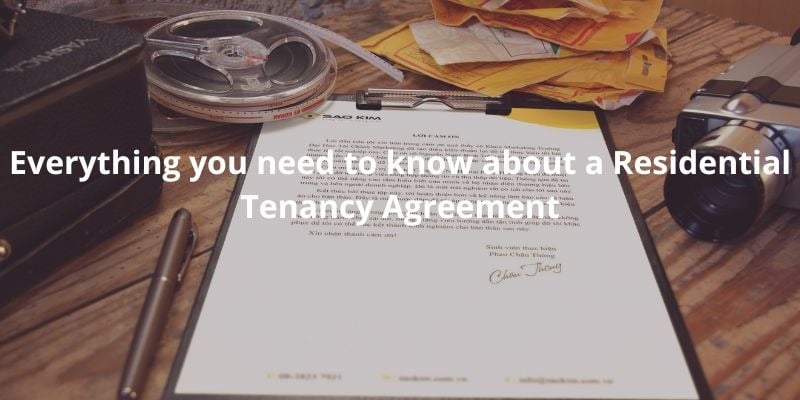Everything you need to know about a Residential Tenancy Agreement
11 Jan 2023
15 Jun 2022
min read

Signing a tenancy agreement is a major commitment. Make sure you fully understand its contents before leaving the ink to dry on yours.
Using a tenancy agreement template will allow you to be confident that the main requirements for tenancy are met. Learn more below about the importance of tenancy agreements and their various components.
I. What is a tenancy agreement?
A tenancy agreement is a legally binding contract between a landlord and their tenant(s) which purports to create a tenancy for a period generally not exceeding 3 years. It details the precise arrangements for the management of the property and has important implications for the rights and obligations of both landlord and tenant.
Before you proceed to the contents of a tenancy agreement, make sure that a tenancy agreement is what best fits your desired rental arrangement as compared to other types of legal documents.
For instance, leases best govern fixed-term tenancies of more than 3 years, whilst a license is typically used for short-term uses of land such as staying in a hotel room or setting up a shopping mall kiosk. Hence, depending on how long you wish to lease your property out for, a lease or license may be more appropriate than a tenancy agreement.
If you are unsure of which document best suits your purposes, you can refer to our guide for more information on this topic.

II. Types of Residential Tenancy Agreements
This post focuses on residential tenancy agreements, which concern leases of property for living purposes (e.g. houses and apartments). Different considerations apply to commercial tenancies, which are usually established for the running of business operations or services.
In most jurisdictions, residential tenancy agreements generally offer a higher level of protection than commercial leases for tenants. However, tenants should use their property strictly for residential purposes.
Residential tenancies differ across jurisdictions but generally take two forms:
-
Fixed-term tenancy: A rental agreement that lasts for a specific duration (typically one year). In some jurisdictions like the United Kingdom, these automatically convert into periodic tenancies upon expiry unless ended by notice.
-
Periodic tenancy: A rental agreement with no fixed length. It automatically renews at the end of each stipulated period and is ended by giving notice. These tenancies are suitable for short-term plans.
III. Why is a tenancy agreement important?
A residential tenancy may be validly established by oral means and without legal consultation. However, the use of a written tenancy agreement is the norm for the many benefits which accompany it. It provides a record of the exact agreements between the landlord and tenant regarding the use of the property, which upholds the certainty of any agreements and reduces the likelihood of future disputes. It may also give effect to special agreements between parties, such as rent-free periods or custom termination arrangements.
Additionally, it allows all parties to understand their respective rights and responsibilities regarding the property. For tenants, this might include important information such as the need for proper upkeep of the property, or responsibility for payment of utility/management bills. Likewise, landlords may also be responsible for conducting repairs or paying applicable taxes for the property.
If a tenancy agreement is poorly drafted, both landlords and tenants may find themselves burdened by unforeseen obligations without proper recourse. In some cases, landlords may even become liable to third parties for breaches committed by their tenants.
Hence, take care to thoroughly read through any given tenancy agreement before inking on your signature. Whilst admittedly not the most entertaining task, it will relieve you from any future headaches which may arise from dealing with your rental property.

IV. When is a tenancy agreement legally effective?
Generally, tenancy agreements do not have demanding formalities requirements and involve a simpler method of execution. In contrast to leases, tenancy agreements are not usually subject to registration requirements (i.e. bringing and registering the document with the local Land Registry) and do not require execution by deed to take legal effect.
Do note, however, that formalities for execution vary depending on the length of the tenancy, the capacities of parties entering the agreement, and each jurisdiction’s rules and requirements. It is best to find relevant local guidance or to consult a local lawyer to confirm any relevant formalities which may be applicable to you.
Tenancy agreements must also not include terms that give landlords or tenants lesser rights than those enjoyed under common law or statute. In some jurisdictions like the United Kingdom, these agreements are treated as “shams” and are unenforceable.
V. Can I amend a tenancy agreement after I have signed it?
If both tenant and landlord agree, changes to the tenancy agreement should be recorded in writing and can be effected either by drawing up a new document or amending the existing agreement.
VI. Components of Tenancy Agreements
Despite there being various kinds of tenancy agreements, most of them share the following essential clauses in common.
A. Identify Parties
Parties whom the agreement is between must be clearly identified in the document. This usually includes the legal name and address of each contracting party over the age of 18.
Extra caution should be exercised if tenants are contracting with a landlord’s property agent, who might have different personnel managing the upkeep of the property.
*Personal note: During my first experience renting living accommodation in the United Kingdom, the tenancy agreement was signed by an overseas property agent based in Malaysia. However, any issues with the property (such as repairs) were handled separately by a local agent in the UK.
Therefore, it is important for tenants to clearly identify who to contact for any inquiries or issues regarding the property. Feel free to check out our specific template on tenancy agreements with managers/representatives of landlords.
B. Identify Property
The name and address of the specific rental property in question should be clearly set out in the agreement. If the property is furnished, the landlord should also clarify whether any furniture and fittings are part of or included in the rental property.
C. Term of Tenancy
The length of the tenancy should be set out in exact dates, avoiding vague terms (e.g. “a period of 6 months” or “one year”) to prevent any potential confusion. This is particularly so in some jurisdictions where a specific commencement date is needed for the agreement to be valid.
D. Rent
The amount of rent and schedule for payment should be clearly set out. Paying arrangements are generally quite flexible, with sums typically paid on a monthly or quarterly basis.
The landlord may also include provisions that impose interest on rent in arrears (e.g. 3% for rent unpaid for over 14 days) or revisions to the base rate of the rent itself.
E. Security Deposit
The amount of the deposit collected and the date of collection should be specified, along with the details of the bank account in which the deposit is held. In some jurisdictions like Hong Kong or the United Kingdom, deposits are usually equivalent to two or three months’ rental.
The landlord should clarify the circumstances under which deductions can be made from the deposit and outline the procedures for the return of the deposit upon the expiration of the lease.
F. Other Charges
The agreement should detail responsibility for payment of charges such as utility bills, management fees, or property tax. It is recommended that this be set out in clear and simple language to avoid any disputes which may arise in relation to them.

G. Landlord’s Responsibilities
Provided the other conditions (e.g. rent, deposit) are fulfilled, the landlord comes under various responsibilities for the maintenance of the property. This usually involves preserving the property in a clean and tenable condition before commencement of the tenancy, or repairing any defects which may occur during the tenancy - provided they are not intentionally or negligibly caused by the tenant. Landlords should also pay heed to any other relevant statutory obligations in their jurisdictions.
Importantly, landlords must ensure that they respect the exclusive possession of their tenants over the property. This means that they can only conditionally enter the property, such as for the purpose of carrying out requested repairs.
H. Tenant’s Responsibilities
The tenant comes under statutory obligations which vary depending on the jurisdiction. However, common provisions may include duties to maintain the interior of the property, not to cause a nuisance to others, not to use the property for illegal or immoral purposes, and to use the property for purely residential purposes.
Landlords should also state any specific requirements for use of the property, such as clauses against keeping pets or prohibiting subletting of the flat. Responsibility for payment of utility bills, management fees, or property tax is also a common provision subject to negotiations between landlords and their prospective tenants.
I. Termination Clause
The termination clause sets out the circumstances in which either party can bring an early end to the lease (also called a “break clause”). It should specify the minimum period of notice to be given for the lease to be terminated early to give both the tenant and the landlord time to find a suitable replacement.
Residential properties typically require written notices to be provided well in advance. In some cases, tenants may even need to pay an early termination charge should they fail to provide adequate notice of termination. Additionally, a landlord will often stipulate that they can terminate the lease if tenants fail to pay rent for a certain duration or cause substantial damage to the property.
Attention should particularly be paid to termination arrangements if the tenant is a student or other individual who might not intend to rent the property for the entire duration of the lease (e.g. to return home during summer vacation). Adhering to the agreed period of notice stipulated in the agreement is crucial to avoid being held liable for any additional rent beyond your intended stay.
We encourage you to try our customisable templates for notices of early termination to find a document best suited for your needs.
Frequently Asked Questions
1. Can I write my own tenancy agreement?
Yes, you can write your own tenancy agreement without being represented by a lawyer. It is best to use a tenancy agreement template that contains all the necessary information for an effective agreement.
2. What is the difference between a tenancy agreement, a lease, and a license?
The main difference is the length and purpose of the tenancy which you intend to create. A tenancy agreement best suits rentals not exceeding 3 years in length. A lease suits longer rentals and commercial businesses. A license suits short-term usage of the property where exclusive occupation may not be necessary.
Check out this table for more information on the appropriate document to use.
3. Can I add a new tenant to the tenancy agreement?
Yes, you can add a new tenant to the agreement through an amendment to the tenancy agreement. New and old tenants will be jointly and severally liable for obligations under the tenancy agreement. This means that all tenants share equal responsibility for things such as rent and maintenance.
4. Can I get out of a tenancy agreement early?
This depends on the nature of the agreement. For residential tenancy agreements, it is common to see “break clauses” which allow tenants to end their tenancy agreement early by providing advanced notice.
Some agreements may also allow tenants to terminate their tenancy early if they agree to pay an early termination fee.
5. What is a tenancy in common and how is it different from a joint tenancy?
A tenancy in common is where two parties agree to enter into co-ownership of property, often with different percentages of ownership. It is to be distinguished from a joint tenancy, where all tenants are jointly entitled to the whole of the property interest.
Feel free to check out our tenants in common agreement template if you are considering this type of arrangement.
Related Documents
-
Renewal of Tenancy Agreement: For simple renewals of tenancy agreements on the same terms and conditions as the Original Agreement.
-
Month to Month Tenancy Agreement: For shorter leases of residential property which continue on a month-month basis until termination by notice.
-
Early Termination Notice in relation to Tenancy / Lease: Different versions of notices for either party to invoke early termination of tenancy.
-
New Tenant Amendment: An amendment to the tenancy agreement to include a new tenant.
Please note that this is a general summary of the position under common law and does not constitute legal advice. As the laws of each jurisdiction may be different, you may wish to consult your lawyer.
Keywords:

